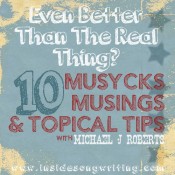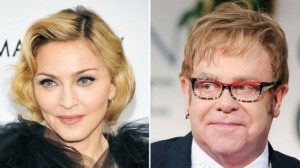Musycks Musings & Topical Tips 10: Even Better Than The Real Thing?

Even Better Than The Real Thing?
A weekly column by Inside Songwriting contributor, Michael J Roberts.
When it comes to consuming music we can safely put people into two camps, those that don’t mind a level of artificial manipulation in their music and those that do. By that I mean that it is fine for any record by Lady Gaga or Nicki Minaj to have a large degree of audio tricks applied in order to create an interesting or commercial result, and in a way that doesn’t apply to others. There are many artists who can never treat their work with audio fakery, at least not to a degree where there are obvious ‘un-natural’ elements, as that would be counter productive to the authentic experience their work relies upon, or what their audience demands. So, how much manipulation of sound, in a recording or live concert context is too much, and what are the implications for people who write for either medium?
Within the two schools there seems to be a dividing line between people who think that live versions must reproduce the record note for note, and the other camp who think it’s perfectly acceptable for a live version to be different to a recorded version. It makes no sense to make records too complex to reproduce live if your live act is predicated upon an honest and natural concert experience. Equally if your audience is not too fussy about being presented with a live sound that is ‘augmented’, either by synchronised midi sequencing or by other means, then it would seem reasonable to use all tools at your disposal to create a great show. It would be bizarre to hear Mumford and Sons or even Keith Urban use massive amounts of pitch bending or auto tune on their vocal track as they need to have a ‘connection’ with their audience based on a clear understanding that they are able to sing the lines the audience hears.
The Tacit Compact
As with most artistic questions the answer is very subjective, but what is essential is that every writer or artist understands the tacit compact between provider and listener. If your audience views it as an important component, that the artist be able to deliver the same level of musicianship in a live context as they do on record, then the compact dictates you don’t stray too far outside that idea. If your audience only wants a ‘celebrity’ level experience, that is a shot of disposable, personality driven music, then the content is relegated to a secondary importance and any level of audio trickery is permissible.
Everybody seems to accept that a recording is a product of possible repeated attempts at getting ‘the perfect take’, and also value the fact that a performer can replicate that effort in a live environment. Some acts forge a reputation on that very point, notably Bruce Springsteen who uses a 14 piece band to bring his songs to life, making even epic recordings more vivid and alive on the concert stage. It would be unthinkable for Springsteen, or Paul McCartney or The Eagles for instance, to use ‘tapes’ to augment their live sound, yet some big rock and pop bands do this as a matter of course. I’ve seen Kanye West use mostly tapes on stage with a couple of string players on stage for visual if not aural support, but do the same rules apply?
In the early days of rock and pop it was common for what was produced on stage to be what the band could play, but occasionally liberties were taken. In the ‘60s The Rolling Stones famously hid their ‘ugly’ piano player, Ian Stewart, behind the stage because he didn’t conform to their ‘look’. These days they augment their mighty stage sound with a myriad of extra musicians and singers, not a curtain to be seen. The Who were one of the first bands to augment their live show with tapes after Pete Townsend made elaborate synthesiser parts for their epic album Quadrophenia in 1973, hooking up manic drummer Keith Moon to a click track. In the ‘70s there were no real precedents for this, and these days the band goes out with a massive backing section and don’t use tapes at all.
Reg V Madge
For a famous example of somebody getting his famous silk boxers in a knot over the issue of ‘backing tapes’ in a live show, I offer the case of Elton John V Madonna m’lud. Elton spat the dummy from the pram in 2004, accusing Madge of lip-syncing in concert, and reiterated the comments in 2011, saying, “Anyone who lip-syncs should be shot. Just take ’em out on the street and shoot ’em. I think Madonna’s a fantastic showgirl, show-woman, and I’m a big fan of some of her records. I didn’t want to hurt her feelings, and subsequently I’ve made up and apologized. I think she paved the way for everybody, but I am right. I’m right. Live means live.”
Singers who dance, like Madonna or Kylie Minogue or Beyonce, have a much more challenging problem in terms of breathing and it seems that all resort to a level of vocal support. It seems Elton is ‘old school’ when it comes to this but he possibly arbitrarily supplies his condemnation as there are many other bands that resort to electronic fakery when it comes to their stage act, notably Coldplay and U2.
Coldplay present as a 4 piece on stage and yet recreate their epic records note for note, epic orchestrations and vocal choirs magically conjured out of the speakers! U2 have layered and subtle keyboards and percussion, chorused vocals and second guitars all over their 3 piece band sound, yet not a mention of any ‘tapes’ or additional musicians under the stage! Not a peep of criticism about this sleight of hand? Do their fans come away unfulfilled as a result of the ‘live’ gig? I for one did not with U2, but it does disappoint me that they continually fail to acknowledge their use of ‘augmentation’.
Brian Wilson presented an astonishing show through the 2000’s but had about 12 singers to support him, including a couple of Brian ‘shadow’ singers, but the results were sublime, nobody walked away moaning about fakery.
A Horse Of a Different Colour
It certainly seems that people who hanker for an ‘authentic’ experience with their music will lean towards music that is honestly delivered on stage. Giants like Bob Dylan and Neil Young routinely change or extend their songs in arrangement in their live shows, Bob to an extreme sometimes where songs become almost unrecognisable from their recorded antecedents. The frisson of the unknown is a positive in the eyes of their fans, yet fans (sometimes the same ones) that go to see The Eagles would probably be disappointed if that band applied the same experimentation.
For any writer who has to incorporate the differences between the recorded and the live version of songs they’ve written it would seem a miasma of confusion at times, having to contend with the various implications, but really the rule is simple. If your music is honest and real, it is likely you’ll need to adhere to that aesthetic in any context. Conversely, if your music is a confected construct, designed for an ephemeral ‘entertainment’ market, knock yourself out with trickery/fakery. As with most things in this roller-coaster industry problems only arise when you confuse one with the other.
It’s ironic that a fall in sales of recorded product, or more accurately a reduction in income to the artists for recorded music via illegal downloading, has led to artists having to embrace the live scene even more. This has led to a greater requirement for artists to cut the mustard live, and a real opportunity for acts to hone their skills and make a mark as great live performers. A good artist knows that changing a version for live consumption is fine, as long as it’s effective. Ultimately, I think people respond to the authentic, (even authentic fakery) so in the long run the truth will out.
Tw: @Musycks
RELATED POSTS / LINKS:
Musycks Musings & Topical Tips Home





